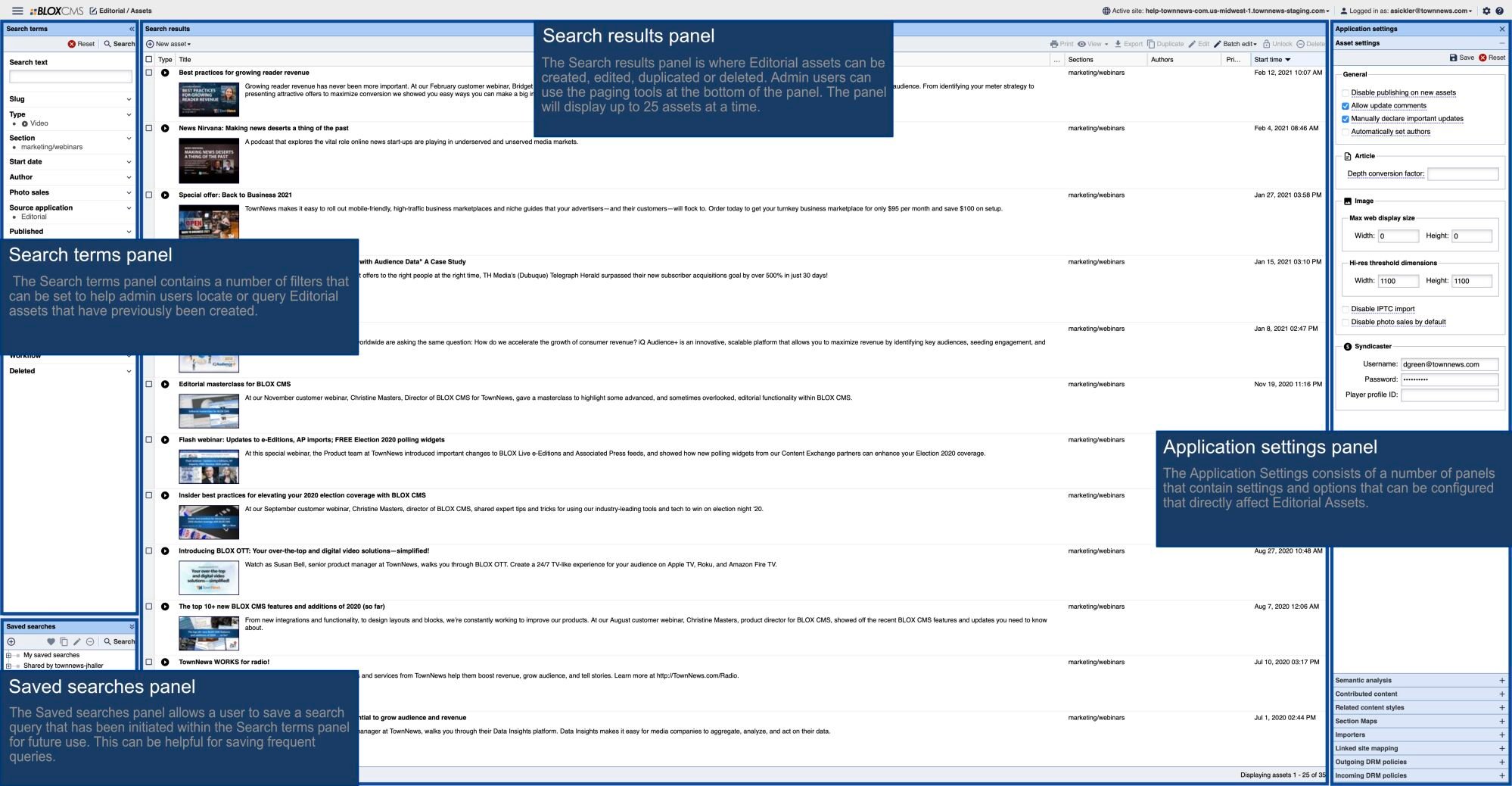Create Live Channel
To create a new live channel record, make a POST request to this URL:
Request
This request should contain a single parameter named “xml”. That parameter should contain an XML string with the information you want recorded into our system:
POST /v2/channel/create HTTP/1.1
Content-Type: application/xml
Authorization: username:password
Host: api.field59.com
Expect: 100-continue<?xml version="1.0" encoding="UTF-8"?>
<channel>
<title><![CDATA[Channel Title]]></title>
<account><![CDATA[ACCOUNT]]></account>
<description><![CDATA[descriptive text]]></description>
<category><![CDATA[category]]></category>
<tags>
<tag>api</tag>
</tags>
</channel>api Title is required for creation. Wrap all text in CDATA markup. If a parameter is not available or in use, omit the node.
The account the channel will be associated with. ONLY valid if the API user is associated with multiple accounts.
Categories of events to include in this channel (automotive, business, culture, education, entertainment, games, health, information, lifestyle, news, politics, religion, shopping, sports, technology, travel, weather). Default: any category.
Keywords for events to include in this channel. Default: any keyword.
Response
If the channel has been successfully created, the server will respond with a 200 OK response, and an XML response with a channel node containing the key of the newly created channel and links to available actions that can be followed by your application to perform subsequent actions.
HTTP/1.1 200 OK
<?xml version="1.0"?>
<createresponse>
<channel>
<key><![CDATA[FILE KEY]]></key>
</channel>
<actions>
<postUpdatedChannelInfo>https://api.field59.com/v2/channel/[FILE KEY]</postUpdatedChannelInfo>
<deleteChannel>https://api.field59.com/v2/channel/[FILE KEY]</deleteChannel>
<getChannelInfo>https://api.field59.com/v2/channel/[FILE KEY]</getChannelInfo>
<getChannelSchedule>https://api.field59.com/v2/channel/schedule/[FILE KEY]</getChannelSchedule>
</actions>
</createresponse>Code Example
In PHP, use curl to make the request.
<?php
try{
$xml = '<?xml version="1.0" encoding="UTF-8"?>
<channel>
<title><![CDATA[News Channel]]></title>
<tags>
<tag>newscast</tag>
</tags>
</channel>';
$url = 'https://api.field59.com/v2/channel/create';
$ch = curl_init($url);
curl_setopt($ch, CURLOPT_POST, 1);
curl_setopt($ch, CURLOPT_POSTFIELDS, "xml=" . $xml);
curl_setopt($ch, CURLOPT_HTTPAUTH, CURLAUTH_BASIC);
curl_setopt($ch, CURLOPT_USERPWD, 'username:password');
curl_setopt($ch, CURLOPT_RETURNTRANSFER, true);
$content = curl_exec($ch);
com.dotmarketing.util.ServletResponseCharacterEncoding@4cb171ff = curl_getinfo($ch);
print_r($content);
print_r(com.dotmarketing.util.ServletResponseCharacterEncoding@4cb171ff);
curl_close($ch);
} catch (Exception $e) {
var_dump($e);
}Get Channel Info
To get information about a live channel in the system, make a GET request from the following url:
https://api.field59.com/v2/channel/[FILE KEY]Request
GET /v2/channel/[FILE KEY][?timezone] HTTP/1.1
Content-Type: application/xml
Authorization: username:password
Host: api.field59.com
Expect: 100-continuetimezone: the timezone used to convert timestamps in results.
Valid values: one of http://www.php.net/manual/en/timezones.php
Default: UTC
Example: America/Chicago
Response
<?xml version="1.0"?>
<channel>
<timeZone><![CDATA[America/Chicago]]></timeZone>
<key><![CDATA[FILE KEY]]></key>
<stream><![CDATA[Stream Name]]></stream>
<title><![CDATA[Channel Title]]></title>
<account><![CDATA[ACCOUNT]]></account>
<description><![CDATA[descriptive text]]></description>
<create_date><![CDATA[2013-10-01 16:15:41]]></create_date>
<last_update><![CDATA[2013-10-02 15:45:18]]></last_update>
<deleted></deleted>
<category><![CDATA[category]]></category>
<tags>
<tag><![CDATA[api]]></tag>
</tags>
<events>
<event>
<timeZone><![CDATA[UTC]]></timeZone>
<key><![CDATA[FILE KEY]]></key>
<title><![CDATA[API Test]]></title>
<stream><![CDATA[Stream Name]]></stream>
<description></description>
<summary></summary>
<create_date><![CDATA[2013-10-14 23:42:47]]></create_date>
<last_update><![CDATA[2013-10-14 23:42:47]]></last_update>
<category><![CDATA[category]]></category>
<tags>
<tag><![CDATA[api]]></tag>
</tags>
<schedule>
<startDate><![CDATA[2013-10-15 02:00]]></startDate>
<endDate><![CDATA[2013-10-15 03:00]]></endDate>
<endRepeat><![CDATA[2013-11-05]]></endRepeat>
<repeats><![CDATA[Tue, Wed]]></repeats>
</schedule>
</event>
</events>
</channel>Code Example
In PHP using curl to make the request:
<?php
try{
$url = 'https://api.field59.com/v2/channel/[FILE KEY]?timezone=America/Chicago';
$ch = curl_init($url);
curl_setopt($ch, CURLOPT_HTTPAUTH, CURLAUTH_BASIC);
curl_setopt($ch, CURLOPT_USERPWD, 'usernamehere:passwordhere');
curl_setopt($ch, CURLOPT_RETURNTRANSFER, true);
$content = curl_exec($ch);
com.dotmarketing.util.ServletResponseCharacterEncoding@4cb171ff = curl_getinfo($ch);
print_r($content);
print_r(com.dotmarketing.util.ServletResponseCharacterEncoding@4cb171ff);
} catch (Exception $e) {
var_dump($e);
}Get Live Channel Schedule
To get the schedule of events that make up the live channel, make a GET request from the following url:
Request
GET /v2/channel/schedule/[FILE KEY][?timezone] HTTP/1.1
Content-Type: application/xml
Authorization: username:password
Host: api.field59.com
Expect: 100-continuetimezone: the timezone used to convert timestamps in results.
Valid values: one of http://www.php.net/manual/en/timezones.php
Default: UTC
Example: America/Chicago
Response
<?xml version="1.0"?>
<channel>
<timeZone><![CDATA[America/Chicago]]></timeZone>
<key><![CDATA[FILE KEY]]></key>
<stream><![CDATA[Stream Name]]></stream>
<title><![CDATA[Channel Title]]></title>
<account><![CDATA[ACCOUNT]]></account>
<description><![CDATA[descriptive text]]></description>
<create_date><![CDATA[2013-10-01 16:15:41]]></create_date>
<last_update><![CDATA[2013-10-02 15:45:18]]></last_update>
<deleted></deleted>
<category><![CDATA[category]]></category>
<tags>
<tag><![CDATA[api]]></tag>
</tags>
<thumbnail_image>
<title><![CDATA[Stream Name]]></title>
<url><![CDATA[thumburl.png]]></url>
<alt><![CDATA[Stream Name]]></alt>
</thumbnail_image>
<schedule>
<instance>
<key><![CDATA[FILE KEY]]></key>
<title><![CDATA[API Test]]></title>
<startDate><![CDATA[2013-10-15 02:00]]></startDate>
<endDate><![CDATA[2013-10-15 03:00]]></endDate>
</instance>
</schedule>
</channel>Code Example
In PHP using curl to make the request:
<?php
try{
$url = 'https://api.field59.com/v2/event/schedule/[FILE KEY]?timezone=America/Chicago&hours=12';
$ch = curl_init($url);
curl_setopt($ch, CURLOPT_HTTPAUTH, CURLAUTH_BASIC);
curl_setopt($ch, CURLOPT_USERPWD, 'usernamehere:passwordhere');
curl_setopt($ch, CURLOPT_RETURNTRANSFER, true);
$content = curl_exec($ch);
com.dotmarketing.util.ServletResponseCharacterEncoding@4cb171ff = curl_getinfo($ch);
print_r($content);
print_r(com.dotmarketing.util.ServletResponseCharacterEncoding@4cb171ff);
} catch (Exception $e) {
var_dump($e);
}Update Channel
To update an existing channel record, make a POST request to this URL:
https://api.field59.com/v2/channel/[FILE KEY]Request
This request is otherwise identical to the Create Live Channel request. It should contain a single parameter named “xml”. That parameter should contain an XML string with the information you want recorded into our system. Wrap all text in CDATA markup. If a parameter is not available or in use, omit the node.
Delete Channel
To delete a channel record, make a DELETE request to this URL:
https://api.field59.com/v2/channel/[FILE KEY]Request
DELETE /v2/channel/[FILE KEY] HTTP/1.1
Content-Type: application/xml
Authorization: username:password
Host: api.field59.com
Expect: 100-continueCode Example
In PHP using curl to make the request:
<?php
try{
$url = 'https://api.field59.com/v2/channel/[FILE KEY]';
$ch = curl_init($url);
curl_setopt($ch, CURLOPT_HTTPAUTH, CURLAUTH_BASIC);
curl_setopt($ch, CURLOPT_USERPWD, 'usernamehere:passwordhere');
curl_setopt($ch, CURLOPT_RETURNTRANSFER, true);
curl_setopt($ch, CURLOPT_CUSTOMREQUEST, "DELETE");
$content = curl_exec($ch);
com.dotmarketing.util.ServletResponseCharacterEncoding@4cb171ff = curl_getinfo($ch);
print_r($content);
print_r(com.dotmarketing.util.ServletResponseCharacterEncoding@4cb171ff);
} catch (Exception $e) {
var_dump($e);
}



